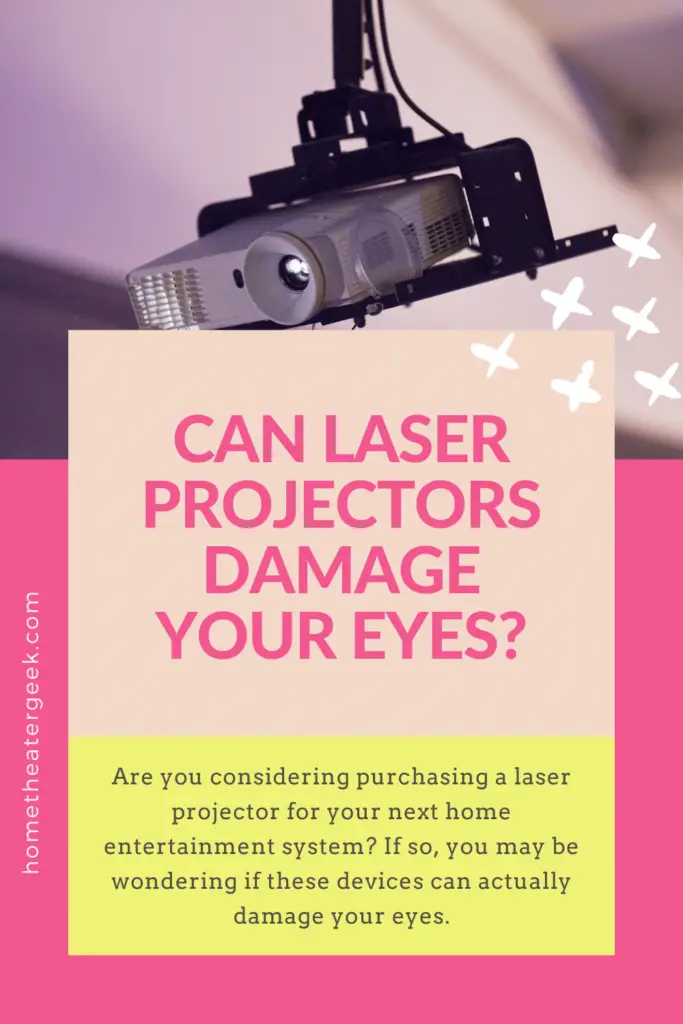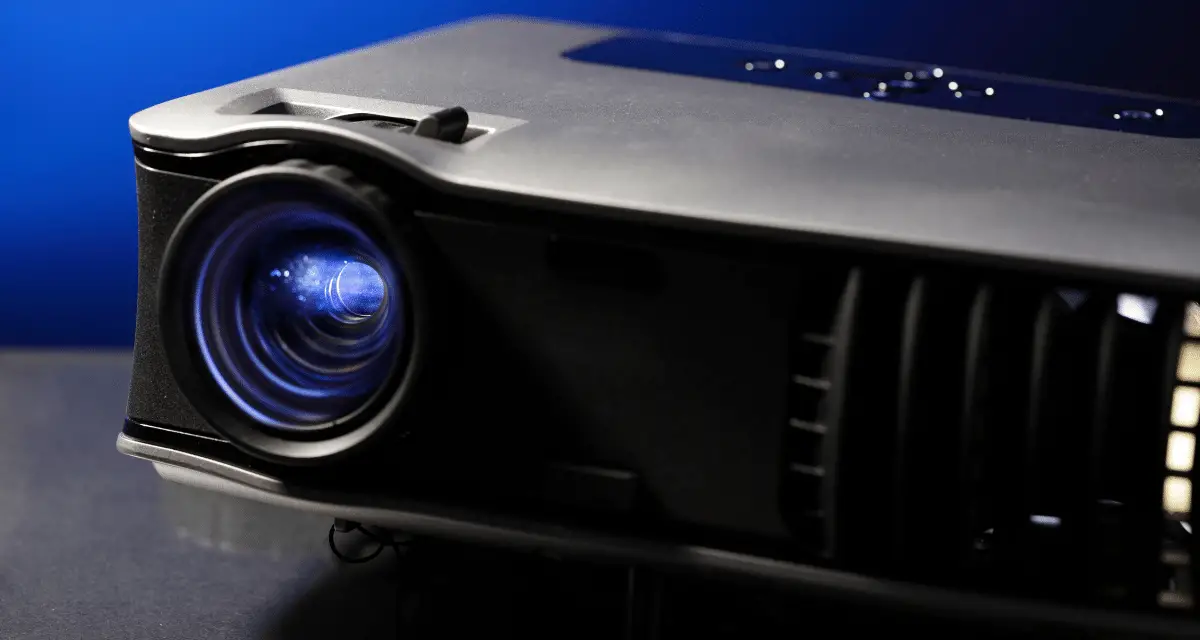We hope you love the products we recommend! Just so you know, we may collect a share of sales or other compensation from the links on this page. Thank you if you use our links, we really appreciate it!
Are you considering purchasing a laser projector for your next home entertainment system? If so, you may be wondering if these devices can actually damage your eyes. In this blog post, we will answer that question and provide some additional information about laser projectors and their potential effects on the human eye. We hope that after reading this post, you will have a better understanding of these devices and whether or not they are right for you.

Table of Contents
Can laser projector damage eyes?
Yes, if the laser projector is not used properly, it can damage the eyes. For example, if you look directly into the laser beam, it can cause permanent eye damage. It is important to be aware of the potential dangers and take proper safety precautions when using a laser projector.
The light from the projector can cause permanent damage to the retina and cornea. It is important to always wear protective eyewear when using a laser projector.
The potential dangers of laser projectors for eyes
Laser projectors are becoming increasingly popular, but there is some concern about their safety. Can they damage your eyes? We investigate.
Most of us are familiar with the dangers of looking directly at the sun. The sun’s ultraviolet (UV) rays can cause serious eye damage, including cataracts, corneal burns, and retinal damage. So it’s no surprise that people are worried about the potential dangers of looking into a laser projector.
Fortunately, laser projectors are not nearly as powerful as the sun. The vast majority of laser projectors used in homes and businesses are Class II or IIIa lasers, which means they’re significantly less powerful than Class IV lasers, which are used in medical and industrial applications. Class II and IIIa lasers are not considered harmful to the eyes when used properly.
The retina is the part of the eye that is sensitive to light. When light hits the retina, it produces an electrical impulse that travels to the brain and is interpreted as vision.
If you look directly into a laser projector beam, you may experience one or more of the following symptoms:
- Immediate pain or discomfort
- Blurry vision
- Watering eyes
- Sensitivity to light
- headache
These symptoms should go away within a few hours. However, if you experience any of these symptoms, it’s important to see an eye doctor as soon as possible.
However, it’s still possible to damage your eyes if you look directly into the beam of a laser projector. This is why it’s important to follow the manufacturer’s instructions and take precautions when using a laser projector.
How to stay safe when using a laser projector?
When using a laser projector, it is important to stay safe by following some simple safety tips. First, always point the laser beam away from people and never look directly into the beam. Also, be sure to keep the power of the laser low enough so that it will not cause any damage if it should come in contact with skin or eyes. Make sure you’re sitting or standing in the correct position. The beam should be directed at the center of your vision, so you don’t want to be too close or too far away.
Moreover, adjust the focus until the image is clear. Once you have the perfect focus, don’t change it! Picking up and moving the projector will cause the focus to change and could result in eye damage. Finally, take breaks often when using the projector. Staring at a bright light for too long can strain your eyes and cause headaches. Give your eyes a rest every 20 minutes or so to avoid any problems. Follow these tips and you’ll be able to use your laser projector without any eye damage!
Some highly recommended laser projectors are:
| Image | Product | Feature | Price |
|---|---|---|---|
|
Editor Choice
 |
LG PF50KA 100” Portable Full HD
|
|
Check Price |
|
TOP Pick
 |
Epson Epiq Vision Ultra Short Throw
|
|
Check Price |
|
Trending
 |
LG HU85LA Ultra Short Throw 4K UHD Laser
|
|
Check Price |
Precautions you can take to further reduce the risk of eye damage
Yes, it is necessary to take some precautions to further reduce the risk of eye damage from a laser projector. Here are some tips:
- Use a laser projector that has been approved by a nationally recognized testing laboratory, such as UL, CSA, ETL, or IEC.
- Read and follow the manufacturer’s instructions for proper use of the projector.
- Be aware that some people are more susceptible to eye damage from lasers than others. If you have any doubts about your safety, consult with an ophthalmologist or other medical doctor before using the projector.
- Do not look directly into the beam of the laser projector, even if the beam is obscured by fog or smoke.
- Keep children and animals away from the path of the beam at all times.
- Be aware of reflective surfaces near the laser projector, such as white walls or glossy surfaces. These can reflect the laser beam and cause eye damage.
- Do not allow the beam to enter your eyes from any angle, even if you are wearing protective eyewear.
- If you are using the projector in a public place, be aware of your surroundings and do not allow the beam to sweep across areas where people could be exposed to it.
- Use caution when moving the projector, as the beam can be deflected by objects in its path.
- Be familiar with emergency procedures in case someone is exposed to the beam. Have a plan for how to shut off the projector quickly and safely in an emergency situation.
Alternatives to laser projectors that are safer for your eyes
If you’re looking for an alternative to laser projectors that is safer for your eyes, there are a few different options available. One option is to use an LED projector, which uses light-emitting diodes (LEDs) instead of lasers to create the image. LED projectors are typically more energy-efficient than their laser counterparts, and they don’t produce the same harmful blue light that can damage your eyesight over time.
Another option is to use an LCD projector, which uses liquid crystal display (LCD) technology to create the image. LCD projectors don’t produce any blue light, so they’re a safer option for your eyesight. However, they can be less bright than laser or LED projectors, so you may need to adjust the settings to compensate.
Finally, you can also opt for a DLP projector, which uses digital light processing (DLP) technology to create the image. DLP projectors don’t produce any blue light, and they’re often brighter than LCD projectors. However, they can be more expensive than other types of projectors.
No matter which type of projector you choose, be sure to follow the manufacturer’s instructions for proper usage and care. This will help ensure that your projector lasts for many years and that you get the best possible experience when using it.
Conclusion
So, can laser projectors damage your eyes? The answer is maybe. If you are not careful and do not take the proper precautions, it is possible for a laser projector to cause some amount of eye damage. However, if you use them responsibly and follow the safety guidelines, then there is no reason to be concerned. As long as you keep these things in mind, using a laser projector should be perfectly safe. If you want to use a laser projector and are worried about potential eye damage, read the above guide about how to safely enjoy this type of technology.

